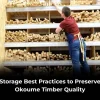Introduction
Choosing the right hardwood timber supplier is one of the most important decisions for builders, furniture makers, architects, and woodworking enthusiasts. With global demand for timber rising and sustainability concerns becoming central, certifications are no longer optional—they are proof of legality, quality, and ethical sourcing. Whether you are sourcing Okoume wood for marine plywood, solid oak for flooring, or walnut for luxury interiors, certifications ensure you are working with a trusted partner who values responsibility and performance.
In this guide, we’ll break down the most important certifications to look for, explore what they actually guarantee, and cover lesser-known but critical aspects like fraud risks, supply chain transparency, and regional standards. If you’re shopping at a woodworking supplies store or negotiating directly with hardwood timber suppliers, this guide will help you ask the right questions and demand proper documentation.
Why Certifications Matter in Timber Sourcing
At first glance, a log of hardwood might look the same whether it’s legally harvested or not. But the certifications behind that wood tell the full story—how it was harvested, whether forests are replanted, what social standards were followed, and even whether the timber will perform reliably in different climates.
Key reasons certifications matter:
- Legality: Ensures the wood is not illegally logged.
- Sustainability: Forests are managed responsibly for long-term use.
- Quality assurance: Many schemes require certain wood grade standards (buyers often check “wood grade images” to compare).
- Market access: Certified timber is accepted in global export markets, especially Europe and North America.
- Reputation: Working with certified timber protects your brand from accusations of greenwashing or unethical sourcing.
The Must-Know Certifications in Hardwood Timber
1. FSC® – Forest Stewardship Council
The FSC® certification is the gold standard in sustainable forestry. It assures buyers that the hardwood comes from responsibly managed forests that protect biodiversity and local communities.
Why it matters:
- Global recognition—most international clients ask specifically for FSC.
- Covers social aspects—worker welfare, indigenous rights.
- Strict auditing process ensures credibility.
2. PEFC™ – Programme for the Endorsement of Forest Certification
PEFC is another leading certification widely recognized in construction and woodworking supplies stores.
Why it matters:
- Strong presence in Europe and Asia.
- Focuses on local certification systems aligned with global standards.
- Easier for small forest owners to join, increasing availability of certified timber.
3. SFI® – Sustainable Forestry Initiative
Primarily strong in North America, SFI ensures forests are responsibly managed while supporting biodiversity and community values.
4. Responsible Wood (Australia)
For buyers sourcing from Oceania, Responsible Wood certification assures that hardwood is harvested in line with both environmental and legal standards.
5. FLEGT (EU Timber Regulation)
The Forest Law Enforcement, Governance and Trade initiative is crucial for ensuring legality of imported timber into Europe. For hardwood timber suppliers exporting globally, this compliance is non-negotiable.
Beyond the Basics: Certifications Others Don’t Tell You About
While the blogs you’ll find online mostly cover FSC and PEFC, there are several critical details often missing that buyers need to know:
Certification Costs & Price Premiums
Certified timber may cost 10–25% more depending on the species and certification type. This premium covers audits, chain-of-custody tracking, and compliance paperwork. For large construction projects, factor this into your budget when sourcing from a hardwood timber supplier.
Verification & Auditing Process
Don’t just take a supplier’s word for it—always verify certifications:
- Ask for certificate numbers and expiry dates.
- Cross-check in public FSC/PEFC databases.
- Look for signs of authenticity like audit reports and unique identifiers.
This step helps avoid fake certificates—a common risk in timber trade.
Regional & Species-Specific Standards
Global certifications don’t cover everything. Some countries have local forestry standards or species-specific rules. For instance:
- African suppliers of Okoume wood may also require CITES compliance.
- In India, domestic forestry approvals may be necessary for hardwood movement.
Chain of Custody & Traceability
Look for suppliers who use digital traceability systems—QR codes, blockchain, or GIS monitoring. This ensures that when you buy timber, it is traceable back to the certified forest.
Social & Ethical Standards
Beyond the environment, certifications should also cover:
- Worker safety in sawmills.
- Fair wages and indigenous rights.
- Community investment by timber companies.
Pitfalls & Greenwashing
Be aware: not all certifications are equal. Some weaker schemes allow suppliers to “window dress” their credentials without strict auditing. That’s why choosing globally respected certifications is critical.
How Certifications Impact Wood Quality
Certification doesn’t just mean ethical sourcing; it often links to better timber quality:
- Moisture content guarantees reduce risks of warping.
- Wood grade images in certification reports help buyers visually compare grades.
- Certified suppliers are more likely to provide kiln-dried timber, ensuring stability in different climates.
This matters greatly if you’re sourcing delicate species like Okoume wood, prized for its lightweight yet durable properties in boatbuilding and furniture.
Checklist: Questions to Ask Your Hardwood Timber Supplier
When you evaluate a supplier, certifications are a starting point. Here’s a checklist of smart buyer questions:
- Can you provide a valid FSC or PEFC certificate with expiry date?
- What percentage of your stock is certified vs non-certified?
- How do you maintain chain-of-custody tracking?
- Can I see your most recent audit report?
- What is the moisture content of your timber, and is it kiln-dried?
- Do you provide wood grade images for clarity on quality?
- Which certifications apply specifically to your Okoume wood products?
Benefits of Choosing Certified Hardwood Timber Suppliers
- Guaranteed legality and sustainability.
- Consistent quality and grading.
- Easier export/import clearance.
- Higher trust with clients in construction and woodworking industries.
- Long-term partnerships built on transparency.
If you’re buying from a woodworking supplies store, ask upfront if their products are FSC or PEFC certified. For large projects, always go direct to certified hardwood timber suppliers.
AEW Wood – Your Trusted Source for Certified Timber
At AEW Wood, we understand that sourcing certified, sustainable, and high-quality timber is crucial for your projects. As a leading hardwood timber supplier, we specialize in premium Okoume wood, marine plywood, veneers, and sustainable hardwoods for construction, furniture, and marine use. Our products come with internationally recognized certifications, ensuring you get eco-friendly, durable, and legally sourced timber. Whether you’re a builder, furniture manufacturer, or a woodworking supplies store, AEW Wood delivers quality with responsibility.
Conclusion
When choosing a reliable hardwood timber supplier, certifications should never be overlooked. They are the backbone of ethical sourcing, consistent quality, and long-term trust. From FSC and PEFC to regional schemes like Responsible Wood, certifications help ensure the timber you buy supports forests, communities, and your own project’s success. Don’t just stop at the basics—verify certificates, ask the right questions, and demand transparency.
If you’re sourcing premium hardwoods, marine-grade Okoume wood, or simply looking for a trusted partner for your woodworking supplies store, AEW Wood is here to deliver certified quality, sustainability, and reliability you can trust.
Frequently Asked Questions (FAQs)
- Which certification is most trusted worldwide for hardwood timber?
FSC is considered the most recognized and trusted certification globally, followed closely by PEFC. - Do certifications increase the price of timber?
Yes, certified timber usually costs 10–25% more, but it guarantees quality, legality, and sustainability—making it a safer long-term investment. - Can I verify a supplier’s certification myself?
Absolutely. Use the FSC or PEFC online certificate databases to cross-check numbers and expiry dates. - Is Okoume wood available with certification?
Yes, reliable suppliers like AEW Wood offer FSC-certified Okoume wood, ensuring sustainable sourcing. - Do certifications cover timber performance and durability?
While certifications primarily focus on sustainability, many certified suppliers also provide guarantees on moisture content, kiln-drying, and proper grading.






